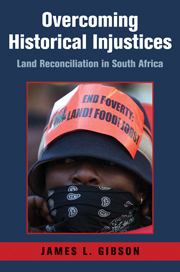Book contents
- Frontmatter
- Contents
- List of Figures
- List of Tables
- Preface and Acknowledgments
- 1 Land Reconciliation and Theories of Justice, Past and Present
- 2 Naming, Blaming, and Claiming on Historical Land Injustices: The Views of the South African People
- 3 Group Identities and Land Policy Preferences
- 4 Applied Justice Judgments: The Problem of Squatting
- 5 Judging the Past: Historical versus Contemporary Claims to Land
- 6 Land Reconciliation and Theories of Justice
- Appendix A A Note on Race in South Africa
- Appendix B The Survey Methodology
- Appendix C The Questionnaire
- References
- Index
- CAMBRIDGE STUDIES IN PUBLIC OPINION AND POLITICAL PSYCHOLOGY
1 - Land Reconciliation and Theories of Justice, Past and Present
Published online by Cambridge University Press: 27 July 2009
- Frontmatter
- Contents
- List of Figures
- List of Tables
- Preface and Acknowledgments
- 1 Land Reconciliation and Theories of Justice, Past and Present
- 2 Naming, Blaming, and Claiming on Historical Land Injustices: The Views of the South African People
- 3 Group Identities and Land Policy Preferences
- 4 Applied Justice Judgments: The Problem of Squatting
- 5 Judging the Past: Historical versus Contemporary Claims to Land
- 6 Land Reconciliation and Theories of Justice
- Appendix A A Note on Race in South Africa
- Appendix B The Survey Methodology
- Appendix C The Questionnaire
- References
- Index
- CAMBRIDGE STUDIES IN PUBLIC OPINION AND POLITICAL PSYCHOLOGY
Summary
One of the most compelling issues for worldwide socio-legal studies has to do with how to reconcile competing historical claims to land. Countries as diverse as the United States, Argentina, and the Philippines are confronted with extremely complex and divisive issues of rectifying land injustices from the past. These conflicts are intractable in part because they implicate exceedingly difficult issues of law, justice, and history.
Nowhere is the issue of land reconciliation more salient than in South Africa. Because the apartheid system and its predecessors were so obsessed with efforts (largely successful) to expropriate the vast majority of the land in the country for the use of the tiny white minority, South Africa's past is now colliding with its present, as demands for land reconciliation are growing in both number and intensity. And with the ever-present specter of Zimbabwe-style land invasions, the issue is seen by many as threatening to the very political and economic stability of the country. How South Africa deals with the injustice of historical land practices will have much to do with the success of the country's attempt at consolidating its nascent democracy.
But land reconciliation is more than “just” an important policy issue. In addition, matters of land injustice are central to the growing interdisciplinary attention to issues of transitional justice (see Hayner 2001, who claims that a new field of research on “transitional justice” has recently emerged).
- Type
- Chapter
- Information
- Overcoming Historical InjusticesLand Reconciliation in South Africa, pp. 1 - 30Publisher: Cambridge University PressPrint publication year: 2009



